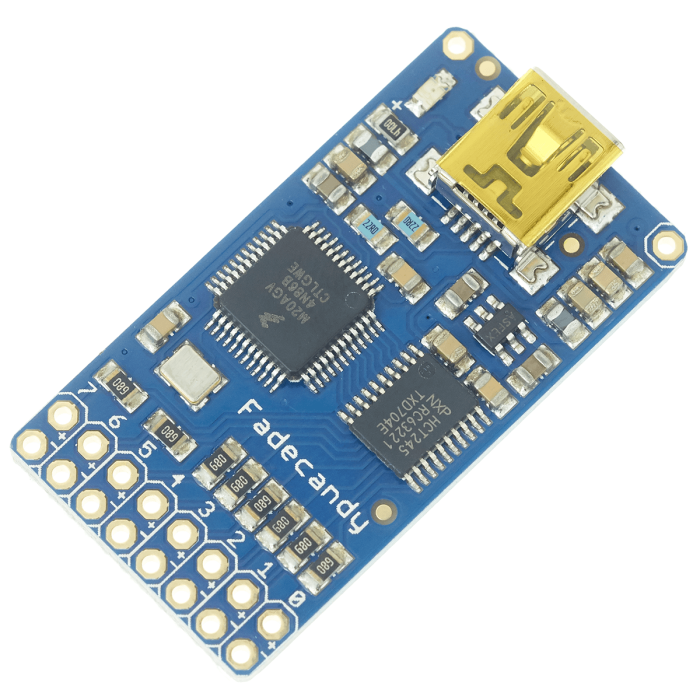FadeCandy - Dithering USB-Controlled Driver for RGB NeoPixels
A collaboration between Adafruit & Micah from Scanlime, Adafruit are excited to introduce Fadecandy, a NeoPixel driver with built in dithering, that can be controlled over USB. Fadecandy is not just hardware! It is a kit of both hardware and software parts that make LED art projects easier to build and better-looking so sculptors and makers and multimedia artists can concentrate on beautiful things instead of reinventing the wheel. It's an easy way to get started and an advanced tool for professionals. It's a collection of simple parts that work well together:
- Firmware that uses unique dithering and color correction algorithms to raise the bar for quality while getting out of the way of your creativity.
- Open source hardware for connecting cheap and popular WS2811 based LEDs to a laptop, desktop, or Raspberry Pi over USB.
- Fadecandy Server Software, which communicates with one Fadecandy board or dozens. It runs on Windows, Linux, and Mac OS, and on embedded platforms like Raspberry Pi.
- The Open Pixel Control protocol, a simple way of getting pixel data from your creative tools into the Fadecandy server.
- Libraries and examples for popular languages. We have Python and Processing already, with Javascript and Max coming soon.
- LEDs Fadecandy works with Adafruit's popular WS2811/WS2812 LEDs. Each controller board supports up to 512 LEDs, arranged as 8 strips of 64 each. Not for use with RGBW NeoPixels, you can only use RGB type at this time.
Fadecandy is designed to enable art that is subtle, interactive, and playful - exploring the interplay between light, form, and shadow. If you’re tired of seeing project after project with frenetic blinky rainbow fades, you’ll appreciate how easy it is to create expressive lighting!
It's also battle tested! The firmware was originally developed to run the Ardent Mobile Cloud Platform, a Burning Man project which used 2500 LEDs to project ever-changing rolling cloud patterns onto the interior of a translucent plastic sculpture. It used five Fadecandy boards, a single Raspberry Pi, and the effects were written in a mixture of C and Python. The lighting on this project blew people away, and it made me realize just how much potential there is for creative lighting, but it takes significant technical drudgery to get beyond frenetic-rainbow-fade into territory where the lighting can really add to an art piece instead of distracting from it.
Headers are not included.

